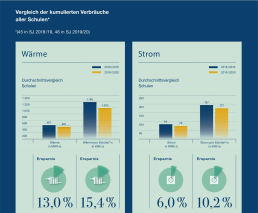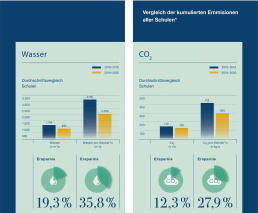UfU Information | Issue 4 – December 2021 | Department of Energy Efficiency & Energy Transition
How Potsdam saves energy
Our flagship project in the field of EE
Why schools need a lot of energy
What do most public buildings have in common? They are large, often old and have high energy requirements. Think of schools, town halls or citizens’ offices. Many people go in and out of these buildings, but only a few of them are really responsible for the building. Many public buildings are also in a poor state in terms of energy efficiency with regard to the building envelope or heating system. This leads to very high energy requirements, especially in schools. The large buildings have to be heated, lit and supplied with electricity, not to mention the enormous consumption of paper, water and other resources. However, as schools are financed by the public sector, there is little incentive for pupils in particular to save energy, as they are not affected by the costs themselves. According to the German government’s climate targets, the aim is to achieve a climate-neutral building stock by 2045. Public buildings and schools in particular pose a major challenge in this respect. UfU is tackling this challenge in the Energy Efficiency Program for Potsdam Schools (EEP).
The energy saving program at Potsdam schools
The city of Potsdam recognized early on that schools in particular have enormous savings potential that can ease the burden on municipal coffers if the target groups at the school are addressed correctly. This is why the Energy Efficiency Program at Potsdam Schools (EEP) has been in place since 1998. The aim is to reduce energy and resource consumption in schools and keep it constant at a low level.
The EEP is a sustainability program that combines educational measures with practical energy-saving projects at schools. Pupils, teaching staff and janitors should be equally involved in the process and make the school more efficient and sustainable in the long term. The Potsdam municipal real estate service (KIS) provides EUR 60,000 in premiums each year for this purpose. Schools that significantly reduce their consumption receive these bonuses. The EEP is carried out by the Independent Institute for Environmental Issues – UfU e.V. and the Berlin Energy Agency (BEA).
1. energy monitoring
As described in the introduction, public buildings suffer from the fact that only a few of the many daily building users really feel responsible for the building. One important exception is the group of janitors. They manage technology, heating systems, repair broken toilet flushes and radiators and are also important multipliers in the building. Serious progress in energy consumption cannot be achieved without this group of people. The EEP therefore addresses the janitors directly and tries to get them interested in the program. Together with UfU, the janitors analyze the energy consumption of all 46 schools. The demand for water, heat and electricity can be tracked in the energy monitoring system, adjusted for weather conditions and displayed graphically. Irregularities are identified immediately with the help of limit value analyses of the energy management system used. In this case, the janitors know immediately that a heating system is faulty, a water pipe is leaking or another problem has occurred in the school.
All janitors meet once a year for a joint EEP workshop. Among other things, this serves to exchange experiences, build teams and discuss technical challenges at the schools. In our experience, most janitors are very committed to their school and work hard to increase efficiency.
2. student projects and workshops
The phenomenon of non-responsibility described at the beginning weighs particularly heavily on pupils. Although they are responsible for a large part of the energy consumption in their school, the distance to the costs, the meter readings and the real energy consumption of the school is very large. It is therefore particularly important to involve schoolchildren in the program in order to achieve a change in user behavior.
Pupils are given the opportunity to carry out their own energy-saving projects at their school. They are supported by the teaching staff,
which sends a report on student activities to the HIS once a month. At the same time, UfU supports the teaching staff in the implementation of the student projects through a monthly consultation hour. This approach encourages pupils to get actively involved in the school and realize their own projects.
The project partners UfU and BEA are also pursuing a further educational approach. In joint workshops with teaching staff and janitors, the pupils get to know their school in a new way. UfU equips the pupils with measuring instruments such as a second thermometer, lux meter, electricity consumption meter,CO2 meter and data logger and analyzes the school’s energy consumption together with the participating teachers. Together with janitors and pupils, the BEA organizes so-called energy tours, during which critical points of energy waste in the building are identified and solutions are discussed.
The EEP bonus system
If the schools actively participate in the EEP, they can collect bonus points. Points are awarded for participating in the annual theme, for workshops, for tours with the janitors, the student projects and other activities that help to save energy or achieve other sustainability goals. The activities now go beyond purely educational measures: joint school clean-ups, waste workshops and switching to recycled school materials are just some of the changes at the schools. In addition to reported activities, points are also awarded for reduced energy consumption, which are directly included in the bonus calculation. The points collected are converted into cash rewards at the end of the year.


Why the program works so well
The EEP is an outstanding program nationwide and a good example of how climate protection can be approached holistically. In an area where climate protection measures and behavioral changes are usually difficult to implement, the program manages to bring about real change by addressing the various target groups well. Teaching staff and janitors are included in the program and thus empowered to make an effective contribution to climate and resource protection. Last but not least, we have known since Fridays for Future that students are not only interested in the climate, but also want to take their demands to the streets, take action and bring about change. The EEP gives pupils the opportunity to work together at their own school. On tours with janitors and in workshops, the pupils learn about the complexity of their building and can optimize consumption together. The competitive nature creates an additional incentive. This leads to noticeable successes.
You can find out more about the EEP here: https://www.energieeinsparprojekt-potsdam.de/


